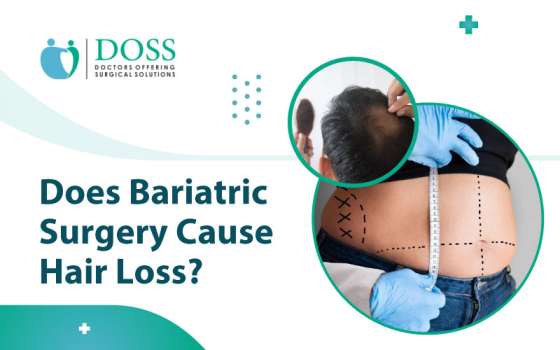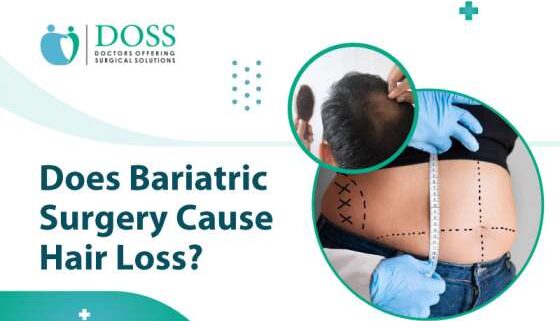Does Bariatric Surgery Cause Hair Loss?
Blog
Are you considering bariatric surgery as a solution for your weight loss journey? If so, having all the information you need to make an informed decision is essential. One question on your mind is whether bariatric surgery can cause hair loss.
Let’s delve into the connection between bariatric surgery and hair loss, providing a comprehensive understanding of the topic.
What is Bariatric Surgery?
Bariatric surgery is a medical procedure designed to aid in weight loss for individuals who are obese or have weight-related health conditions. It involves making changes to the digestive system to restrict food intake or reduce the absorption of nutrients.
Common types of bariatric surgery include gastric bypass, gastric sleeve, and gastric banding.
Must Watch this Video
The Link Between Bariatric Surgery and Hair Loss
Hair loss after bariatric surgery is a common concern among patients. However, it’s important to note that hair loss is not directly caused by the surgery itself but rather by the changes in the body post-surgery.
The main factors contributing to hair loss include nutritional changes and physiological factors.
Understanding Nutritional Changes
After bariatric surgery, your body undergoes significant nutritional changes. The surgery reduces the amount of food you can eat and may also affect the absorption of nutrients.
This change in nutrient intake can lead to deficiencies in vitamins and minerals necessary for healthy hair growth. Specifically, iron, zinc, biotin, and protein deficiencies can contribute to hair loss.
To ensure optimal hair health, it is essential to follow a balanced and nutrient-rich diet recommended by your doctor or nutritionist. Include protein-rich foods like lean meats, fish, eggs, beans, and dairy products.
Additionally, focus on consuming foods high in vitamins and minerals, such as fruits, vegetables, whole grains, and nuts.
Types of Hair Loss After Bariatric Surgery
Hair loss after bariatric surgery is commonly categorized into telogen effluvium and anagen effluvium.
Telogen effluvium is the most common type of hair loss after bariatric surgery. It occurs when many hairs prematurely enter the resting phase (telogen), resulting in increased shedding.
This hair loss typically occurs three to six months post-surgery and may last several months before new hair growth resumes.
Anagen vapor, on the other hand, is less common but can be more severe. It involves shedding actively growing hairs (anagen phase) due to disruption in their growth cycle.
Anagen effluvium is often associated with nutritional deficiencies and can result in more noticeable hair loss.
How Common Is Hair Loss After Bariatric Surgery?
Hair loss after bariatric surgery is common and affects many patients. Studies have shown that between 30% and 50% of patients experience hair loss to some degree within the first six months after surgery.
The prevalence of hair loss decreases as time progresses, with most patients experiencing regrowth within a year post-surgery.
It’s important to remember that individual experiences may vary. Genetics, overall health, and adherence to post-operative dietary guidelines can influence the likelihood and severity of hair loss.
Coping with Hair Loss
Experiencing hair loss after bariatric surgery can be distressing, but there are practical steps you can take to cope with this temporary side effect:
- Be patient: Understand that hair loss is often temporary and part of the body’s natural response to significant changes. New hair growth will occur over time.
- Take care of your hair: Use gentle hair care practices, avoiding harsh styling techniques or excessive heat. Use a wide-toothed comb or a brush with soft bristles to minimize hair breakage.
- Optimize your nutrition: Follow the dietary recommendations provided by your surgeon or nutritionist. Focus on consuming protein-rich foods and foods high in vitamins and minerals essential for hair health.
- Consider supplements: Your Bariatric Surgeon may recommend supplements to ensure you are meeting your nutritional needs. Biotin, iron, zinc, and omega-3 fatty acids are commonly recommended for hair health.
- Consult a specialist: If you have concerns about your hair loss, consider consulting a dermatologist specializing in hair disorders. They can provide personalized advice and treatment options tailored to your specific needs.
Also, Read- Bariatric Surgery Types and Procedures
Prevention and Mitigation Strategies
While hair loss is often unavoidable after bariatric surgery, there are steps you can take to minimize the risk and support healthy hair growth:
- Pre-surgery preparation: Before undergoing bariatric surgery, consult your bariatric doctor in Pune about optimizing your nutritional status. Address deficiencies and ensure your health is best before the procedure.
- Adhere to post-operative surgery guidelines: Following your surgeon’s dietary and lifestyle recommendations is crucial for preventing or minimizing hair loss after bariatric surgery. This includes consuming a nutrient-rich diet, taking prescribed supplements, and maintaining a healthy exercise routine.
- Gradual weight loss: Rapid and excessive weight loss can increase the likelihood of hair loss. It’s important to approach weight loss gradually and sustainably to give your body time to adjust and minimize the impact on your hair.
- Stay hydrated: Drinking adequate water is essential for overall health, including hair health. Dehydration can contribute to hair loss, so drink enough fluids throughout the day.
- Manage stress: Stress can exacerbate hair loss, so finding healthy ways to manage stress levels is essential. Engage in activities that help you relax and unwind, such as yoga, meditation, or spending time in nature.
Conclusion
While hair loss is a potential side effect of bariatric surgery, it is typically temporary and can be managed with proper nutrition and care.
Understanding the link between bariatric surgery and hair loss empowers you to take proactive steps to minimize its impact and support healthy hair growth.
Remember, consulting with your bariatric surgeon will provide personalized advice and guidance if you have concerns about hair loss after bariatric surgery.


 +919011100010
+919011100010 


